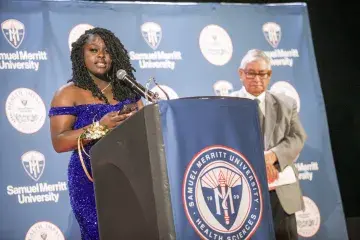Professor Encourages Providers and Patients: Do Ask, Do Tell
Patients would get better medical care if providers were aware of their biases towards assuming patients are straight, according to Samuel Merritt University (SMU) Assistant Professor Ciara Cox.
“To treat me, you have to know who I am,” said Cox, PhD, an occupational therapist. “People just assume you’re straight in this world.”
Cox spoke on “Being Gay in Healthcare” on the SMU Oakland campus Oct. 20 as part of the fall 2016 Community Learning Series. It was the second of three workshops on “Inclusive Practices in Healthcare,” co-sponsored with the SMU Pride Committee. The third, “Trans Healthcare for Dummies,” is set for Tuesday Oct. 25, 12 p.m. to 1 p.m. Room 4001 Peralta Medical Office Building in Oakland.
Lesbian, gay, bisexual and transgender (LGBT) people experience worse health outcomes, Cox said, due both to difficulty in accessing culturally appropriate healthcare as well as chronic conditions such as substance abuse and cardiovascular disease that can accompany the stress of living with discrimination.
Cox noted that the Affordable Care Act provides greater protections and access for all minorities, and said a more diverse healthcare workforce will also be critical in reducing health disparities.
“Harassment and refusal of care has a huge impact on people’s health,” she said, as well as how accepting the social environment is where they live.
Cox offered some startling statistics:
With an estimated 11.5 million LGBT people in the United States, Cox said aspiring healthcare practitioners should provide a safe environment that will encourage their patients to disclose their sexual orientation or gender identity.
“Chances are you’ll have patients who are gay,” said Cox. “Being an inclusive role model will have a huge impact on your patients.”



